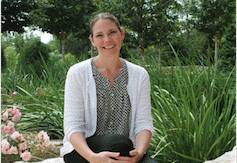This is the second installment in my series on hospice care. See the first installment here.
Before my mother was in hospice, I thought it was basically about keeping the patient comfortable. Period. I've learned it's a whole lot more.
My guest today is Heather Kroski, social worker at Midwest Palliative & Hospice CareCenter.
JB: Welcome to OpEdNews, Heather. Tell us a bit about your job, please.
HK: As a social worker, I provide educational and emotional support to patients, family, caregivers, and often staff at facilities. I provide anticipatory grief around end of life issues and assist families at time of death. As social workers, we are there to advocate for patients and family members. These are my primary responsibilities. But we often wear many hats and find ourselves doing unexpected little things in the moment. I have found myself helping someone carry boxes as they pack up their loved one's belongings or helping someone make stew for their loved one because, in that moment, they needed someone next to them. When I walk into a patient's room or walk in to meet a family, whether for the first time or not, I am there to meet them where they are at, in whatever coping stage that may be. More often than not, I sit with people and listen. Sometimes, that's what people need the most--someone to listen.
JB: How do you do it? I remember your coming to my mother's within moments of her death. I had never met you before and yet you were such a strong, low-key presence at an awful time. Isn't it incredibly emotionally taxing for you?
HK: I remember coming to your mother's house. Walking in did not seem awful to me. Your mother seemed so peaceful and the room was calm and still. While there was much sorrow, I could also feel all the love you, your daughter, and your mom's caregiver had for each other and the life your mom had led. It was an emotional moment that I had the honor of being present at. I am happy to hear that my presence was strong yet low key. I never want to be intrusive in these moments in families' lives.
It can be taxing at times. While present at a death, my job is to be calm and provide comfort while allowing families to grieve in their own way. Self care is also important as a social worker. Being able to share and process my reactions with a trusted colleague after a visit or death can make a difference. It also does not hurt to allow myself time to do something for myself, like dance, which is something I love to do. In addition, it helps me to spend time with my own family, playing with my two young boys and husband. Like everybody, I need to give myself permission to accept what I just did and just experienced with each family as a moment in their lives. It's just a moment. I hope it's a moment during which I am helpful. But it is their moment. It's not about me. It's about them. When I go into a house, it's not about what my goals or needs are in any way. It's about what they want and need and hope for.
JB: I'm glad you know how to take care of yourself. How long have you been doing hospice care, Heather? And how did you get into it in the first place?
HK: Well. most of the time I take care of myself. As most of us know, a good work-life balance can be hard to manage successfully.
Before getting a masters in social work, I was a professional dancer. I have been dancing since I was a young girl and still do. It is a passion that runs deep within me. I do not think I will ever be able to stop dancing. However, there was something missing for me in my life. I was starting a family and no longer wanted to feel that I had to compete for a career as a performer. So, I went back to school to become a social worker to work in the field of hospice care. Yes, I went into social work knowing that I wanted to work in death and dying. It was a career change, a big career change.
I am often asked the question: why do you this? Or how can you do this? When I was in my late twenties, my husband passed away. He received hospice care for his final two months. I remember clearly after he passed, myself and many other family members were gathered around his bed. The hospice nurse arrived to assist us. As we were all crying and holding hands, I looked up at the nurse and saw her smiling. It wasn't a big smile but, a peaceful smile. I remember thinking, how can she do this? Since then, I became interested in how people process and cope with death. I am not sure if having gone through such a personal loss has given me a certain strength to be present with others that are going through the process of losing someone, but I do try to be present with others during their experiences.
(Note: You can view every article as one long page if you sign up as an Advocate Member, or higher).






